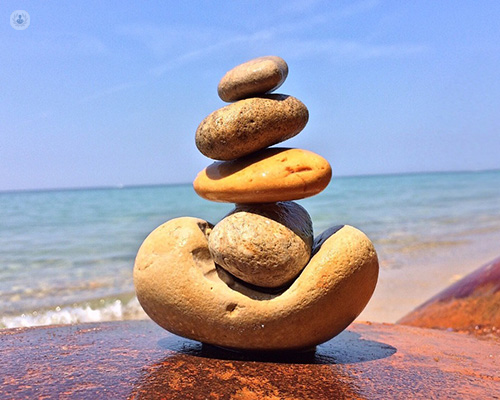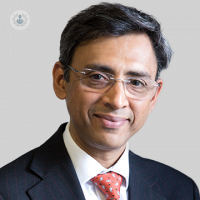What problems can gallstones cause?
Written by:Leading surgeon Mr Satya Bhattacharya explains what can happen when gallstones display symptoms, and the complications that can come along with them. In most cases, gallstones are silent, displaying no symptoms - but what happens if they do?
How are gallstones formed?
Your liver is a solid organ that sits in the right side of your tummy underneath your ribs. From the liver comes a tiny little tube called the bile duct that carries the bile from the liver to your gut to help digest the food. The gall bladder is a little bag the size of a pear that hangs of this bile tube and it stores a little bit of bile, so every time food arrives in your gut after being digested in the stomach, the gall bladders give a little squeeze and the gush of bile comes out and mixes with the food. That is the job of the gallbladder in the body.
If your bile is particularly concentrated, it can form a sediment in the gallbladder, and over a period of time, that can form stones which are called gallstones. In the majority of people, gallstones do not cause any symptoms at all. They’re completely asymptomatic (symptom-free) and picked up by chance. Such gallstones can be left alone. You don’t have to have them removed surgically unless there are certain extenuating circumstances. It is only when they start causing symptoms that you have to worry about gallstones.

What are the symptoms of gallstones?
In milder situations, gallstones can cause pain, which doctors describe as biliary colic. Typically this is pain that comes on after a meal, especially a fatty meal, and often strikes you in the middle of the tummy in the upper part and very often goes around towards the back, towards the right shoulder blade.
It is often associated with vomiting, which sometimes can be quite severe. Many people go to Accident and Emergency with this sort of pain sometimes, and end up having tests done to exclude a heart attack. It’s often ascribed to acid reflux as well.
What complications can gallstones cause?
If the gallbladder gets completely blocked, the stone doesn't allow bile to come out of the gallbladder, which becomes full of stagnant bile. This can then get infected and lead to what is called acute cholecystitis or acute inflammation of the gall bladder. This can be very painful. It almost always requires hospitalisation and more tests, antibiotics, and surgery. This is a particularly nasty complication of gallstones.
Gallstones can also slip into the bile duct and if they do that, then they can block the flow of bile and give you jaundice or they may irritate the pancreas, which also drains into the same duct just before it goes into the gut, and give you pancreatitis which is another nasty complication.
This is the acute scenario and occasionally, people get what’s called chronic cholecystitis or chronic inflammation of the gallbladder, where they keep getting pain (usually after eating) almost on a daily basis. This is called chronic cholecystitis.
In all these cases, gallstones must be treated, and the only way to effectively remove gallstones is through gallbladder surgery.


